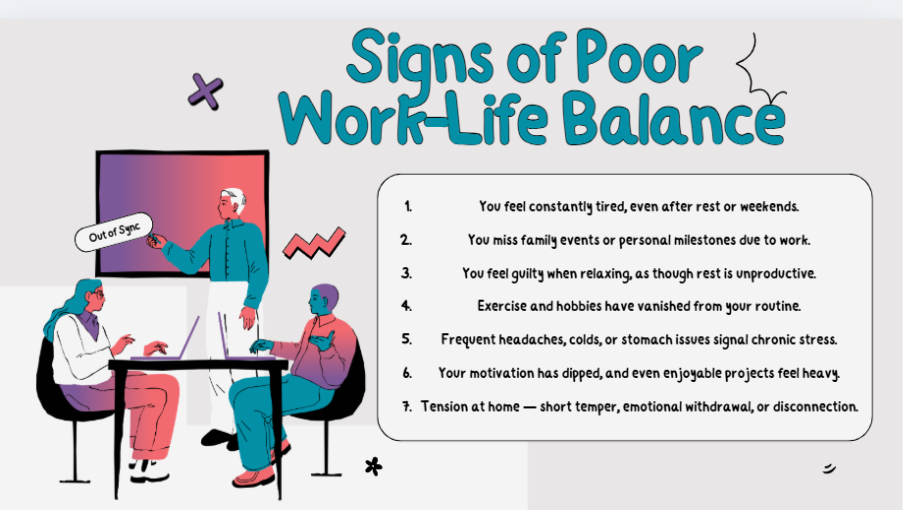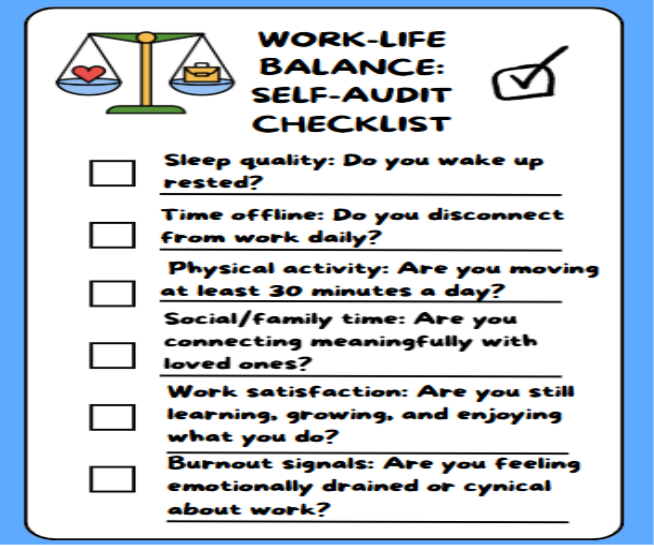Work Related Concerns
Work-Life Balance in India: Meaning, Benefits & Real Strategies That Work

.png)
Written by
Aarohi Parakh,
Psychologist and Content Writer

Reviewed by
Sanjana Sivaram,
Psychologist and Clinical Content Head

Work-Life Balance in India: What It Really Means Today
In India’s fast-paced world of constant deadlines, buzzing WhatsApp groups, and the “just one more email” culture, the phrase “work-life balance” is often thrown around but rarely understood.
Take Parth, for instance, a 28-year-old wealth management professional in Mumbai who starts his day checking emails before his morning chai and often ends it with late-night client calls. His weekends are spent catching up on errands he couldn’t manage during the week. He loves his job yet constantly feels like he’s running on empty. For him, balance isn’t about working less; it’s about not feeling guilty when he finally catches a breath.
For many professionals today, balance doesn’t mean splitting your time 50/50 between work and home. It’s about finding personal harmony and fulfilment — where work energises rather than exhausts you, and life outside work actually feels like living, not just recovery time.
Post pandemic, remote and hybrid work have further blurred boundaries, and long commutes, digital overload, or global clients have made the traditional “9-to-5” obsolete. Thus, the meaning of work-life balance in India has also evolved. It’s no longer a luxury — it’s a necessity for mental health, relationships, and productivity.
Why Work-Life Balance Matters (Especially in India)
In India, work is deeply tied to identity and family reputation. Many of us grow up hearing, “Work hard now, you can rest later.” But in reality, that later rarely comes — and chronic overwork often leads to mental and physical burnout.
Mental Health and Burnout
About 52% of employees experience burnout due to poor work-life balance. Over 51% of Indian employees work more than 49 hours per week, making India second globally among the most overworked nations. Constant fatigue, irritability, and sleep disturbances have quietly become the new normal.
Burnout isn’t just about being tired; it’s emotional exhaustion, when even small tasks feel overwhelming. Over time, this can impact focus, decision-making, and even personal relationships.
That’s why counselling and employee assistance programmes (EAPs) are becoming vital in workplaces. Speaking to 1to1help trained counsellors can help employees process stress early, before it leads to burnout.
Productivity and Job Satisfaction
Employees with a good work-life balance are 21% more productive and report 33% higher job satisfaction. Ironically, overworking doesn’t make us more productive. Employees who take breaks, respect personal time, and feel emotionally supported tend to perform better and more creatively. A software engineer in Bengaluru who logs off at 6 PM and takes an evening walk may outperform a peer who stays till midnight every day. Balance sustains energy — and energy sustains performance.

Family and Social Well-being
In Indian households, family ties are strong and often require attention. Many professionals also have caregiving roles — for children, parents, or both. This “sandwich generation” often juggles work calls and caregiving at the same time, especially in joint or extended families.
A lack of balance not only affects the employee but also impacts family harmony. When stress spills over into personal life, relationships with children and partners are affected too.
The Cultural Context
India’s work culture often celebrates overcommitment — 12-hour-long shifts, weekend meetings, or “urgent” client calls at odd hours. But as awareness around mental health is increasing, more organisations are realising that balance isn’t a perk — it’s a foundation for sustainable success.
7 Signs Your Work-Life Balance Is Out of Sync
It can be easy to normalise working long hours or being under extreme stress, especially if we’ve been doing it for a long time or all our colleagues are in the same boat. So, how do you know when your balance has tipped too far? Here are a few warning signs many professionals ignore until it’s too late:

If you identify with several of these signs, it might be time to pause, reflect, and consciously realign your priorities.
Top 10 Strategies to Improve Work-Life Balance (That Actually Work in India)
The truth is, there is no perfect formula for work-life balance. The goal is not to achieve perfect balance every single day but to find a rhythm that feels sustainable over time. It’s about small, realistic steps that fit your lifestyle — especially in a culture where saying “no” at work isn’t easy. The picture will look different for different people; what matters most is self-awareness and the willingness to show up for work and the other aspects of your life.
Set Clear Boundaries with Work Hours
If you’re working remotely, resist the urge to “just finish one more task.” Define your start and end time and communicate it clearly to your team. Creating small rituals, like logging off work-related devices, closing your workspace door, and changing clothes, can signal closure for the day. Effective time management is a skill that becomes increasingly important; the better one is at managing their time, the easier it will be to log off on time.
Use Commute Time Wisely (or Replace It with Purpose)
For those who have returned to in-person office life, long commutes in cities like Mumbai or Bengaluru can feel draining. Try turning travel into transition time — listen to audiobooks or podcasts, reflect, or practise mindfulness. If you’re a hybrid worker, use that extra hour for exercise or family meals.
Prioritise and Delegate
Indian professionals often find it hard to say no, fearing it’ll be seen as disloyalty. But overcommitment does not benefit the employee or the organisation in the long run. Prioritise what truly matters, and delegate where possible. Remember, saying “yes” to everything often means saying “no” to yourself.
Block Time for Family and Self
Don’t wait for “free time” — schedule it. Protect family dinners, morning walks, or weekend outings like any other meeting. When you make personal time non-negotiable, others start respecting it too.

Digital Detox in the Evenings
India’s work culture often takes it for granted that employees will reply instantly on WhatsApp or late-night emails. But maintaining boundaries are healthy. Try keeping your phone away post 9 PM or set “focus hours.” Things wouldn’t fall apart, and your mind will thank you.
Use “Time-Off” Without Guilt
Sometimes, truly unplugging means taking vacation time and shutting off work altogether for a while. Many employees let their leave lapse or cancel trips, fearing judgement. But taking breaks is not laziness — it’s maintenance. You recharge your devices; do the same for yourself.

Flexibility Over 9-to-5 Rigidity
Encourage conversations with managers around measurable output, not fixed hours. Flexible work arrangements, such as staggered hours, hybrid roles, or part-time options, can empower employees to perform better and feel trusted. To remain competitive, employers must offer flexible work options to attract and retain top talent.
Share the Load at Home
Balance isn’t just an office issue. It starts at home. Household work still disproportionately falls on women in India, even in dual-income families. Encourage open conversations, divide chores, and involve children too — teamwork starts at home.
Talk to Your Manager Early
Don't wait until burnout sets in if you're feeling overburdened. Supervisors often have the ability to reassign work, modify expectations, or connect you with organisational support resources. Crises can be avoided before they arise by having open discussions.
Seek Counselling or Professional Help
Sometimes, despite our best efforts, stress builds up. Speaking to a counsellor can help you understand patterns, build coping skills, and gain perspective. 1to1help trained counsellors provide confidential, judgement-free support designed for working professionals.
💡 Pro Tip: Small wins matter. Improving just one area, like taking lunch breaks mindfully or setting phone-free evenings, can create ripple effects in your routine.
Work-Life Balance for Remote and Hybrid Workers
Working from home doesn’t necessarily guarantee work-life balance. According to Gallup’s research, only 33% of remote workers strongly agree that they have a healthy work-life balance—but so do 27% of hybrid workers and 25% of on-site workers. This gap shows us that flexibility is only part of the equation. Working from home, in reality, often creates an “always on” culture, where work seeps into other aspects of home life. It still takes intention, boundaries, and self-awareness to make the most of the flexibility being provided.
Here’s how to create better balance in a remote setup:

Note to Self: remote work gives flexibility, but boundaries make it sustainable.
Unique Work-Life Balance Challenges in India
Achieving work-life balance anywhere is difficult, but especially in India, where the cultural and diversity dynamics make the equation unique. What works for international counterparts may not directly apply here.
Long Commutes:
Metro city commutes can easily take up 2–4 hours daily. For many, this means less time for exercise, sleep, or family. Employers offering hybrid models or staggered hours can make a huge difference.
Startup Hustle Culture:
Many young professionals glorify “working on weekends” and “burning the midnight oil”. While ambition is great, exhaustion comes at actual human cost. Hustling in the long run cannot sustain results.
The Sandwich Generation:
Many mid-career Indians support both ageing parents and young children. This dual responsibility, combined with demanding jobs, can heighten stress. Family-friendly policies like caregiving leave or daycare support can truly be game changers.
Cultural Stigma Around ‘Me-Time’:
Spending time alone or saying “I need a break” can still be misunderstood. But emotional rest is essential. Rested people show up better for work and loved ones.
Urban vs Rural Divide:
Work-life balance looks very different across India. In cities, long hours and digital overload are common, while in smaller towns, limited flexibility and multiple informal jobs create their own pressures. Slowly, tele-counselling and remote work options are helping bridge this gap, offering more balance and support across regions.
Always-Available IT Culture:
Especially in IT and export industries, global clients mean late-night meetings and 24/7 availability expectations. Managers must consciously balance time zones and avoid rewarding unhealthy work patterns.
What Companies Can Do to Support Work-Life Balance
Promoting a healthy work-life balance means looking at the bigger picture – workload, health, well-being, socialising, restoration, and more — and it’s a shared ecosystem between employees, managers, and organisations.
Here’s what employers can do:
- Promote flexible work policies: Offer genuine flexibility, not just hybrid attendance, but flexible hours, compressed weeks, or part-time options. Work-life integration options, such as picking up your child from school between meetings, can be beneficial for employees.
- Train managers on empathy and boundaries: When leaders model healthy work habits, teams follow.
- Normalise conversations about overload: Employees should feel safe saying, “I’m struggling,” without fear of judgement.
- Encourage time-off culture: Recognise rest as productivity, not absence.
- Mindfulness training for employees: This will help them improve focus, time management, and relaxation
- Provide Employee Assistance Programmes (EAPs): Counselling services like 1to1help allow employees to seek confidential emotional and mental health support anytime.
When companies treat well-being as a performance enabler rather than an afterthought, retention, morale, and innovation all rise.
How to Know If Your Work-Life Balance is Improving: Self-Audit Checklist
Here’s a quick personal check-in you can use weekly:

If you are unable to tick off several areas, it might be time to re-evaluate priorities or speak to a counsellor for perspective.
FAQs
Q1. What is work-life balance in India?
It’s the ability to manage professional responsibilities and personal life without one constantly overwhelming the other. In India, this also includes cultural and family expectations — where success is often tied to long hours — making it even more critical to define what balance means to you.
Q2. Why is work-life balance difficult in Indian companies?
Many Indian workplaces still equate visibility with productivity, have hierarchical cultures, and lack flexible policies — though this is slowly changing. The pressure to always be “available” or prove commitment often discourages employees from taking breaks or setting boundaries.
Q3. How can remote workers maintain boundaries?
Set work hours, establish a physical boundary (e.g., a desk), and communicate availability clearly. It also helps to build end-of-day rituals like switching off notifications or going for a short walk, to signal your mind that work is done.
Q4. What are the signs of poor work-life balance?
Fatigue, irritability, health issues, lack of personal time, and strained relationships. Over time, these can lead to burnout, emotional withdrawal, and a decline in motivation — affecting both individual happiness and professional growth.
Q5. Can counselling help with work-life stress?
Absolutely. Counselling provides coping tools, helps process emotions, and builds resilience — especially when workplace pressures feel heavy. A counsellor can also help you identify unhelpful patterns and create practical strategies to restore balance and confidence.
Final Thoughts: Balance Looks Different for Everyone
There’s no perfect one-size-fits-all formula for balance. For one person, it may mean logging off by 6 PM to spend time with family. For another, it may be taking a midweek break to recharge creativity.
Remember Parth, the professional from Mumbai we met earlier? Over time, he didn’t change jobs or move cities — he started drawing clearer lines between work and life. Morning chai became a moment of calm again, not a prelude to emails. He began saying no to weekend calls and yes to Sunday football with friends.
That’s what real balance looks like — not a dramatic life overhaul, but a series of small, conscious choices that let you feel present, both at work and beyond it.
What matters most is awareness, noticing when things feel off and permitting yourself to recalibrate.
Progress over perfection — always!
Stressed or Overwhelmed? Talk to Someone Who Gets It.
If you’re feeling exhausted or stuck in an endless work cycle, you don’t have to deal with it alone.
1to1help offers confidential, 24x7 counselling in multiple languages — designed specifically for working professionals across India.
Speaking with a trained counsellor can help you regain clarity and balance, whether you're dealing with burnout, anxiety, or stress at work.
Your mental health deserves balance.
References
- Cleveland Clinic. (2024, March 11). Signs of burnout. Cleveland Clinic. https://health.clevelandclinic.org/signs-of-burnout
- Thomas, M. (2022, July 26). What does work-life balance even mean? Forbes. https://www.forbes.com/sites/maurathomas/2022/07/26/what-does-work-life-balance-even-mean/
- Mental Health Foundation. (2023). Work-life balance. https://www.mentalhealth.org.uk/explore-mental-health/a-z-topics/work-life-balance
- Qualtrics. (2023). Employee work-life balance: Definition, benefits, and how to improve it. https://www.qualtrics.com/experience-management/employee/employee-work-life-balance/
- Gallup. (2023, August 14). Employee wellbeing hinges on management, not work mode. https://www.gallup.com/workplace/648500/employee-wellbeing-hinges-management-not-work-mode.aspx
- World Health Organization. (2023). Mental health: Strengthening our response. https://www.who.int/news-room/fact-sheets/detail/mental-health-strengthening-our-response
- BetterUp. (2024, January 9). How to have good work-life balance. https://www.betterup.com/blog/how-to-have-good-work-life-balance
- The Happiness Index. (2024, February 15). The importance of work-life balance. https://thehappinessindex.com/blog/importance-work-life-balance/
- Business News Daily. (2024, March 5). How to improve your work-life balance today. https://www.businessnewsdaily.com/5244-improve-work-life-balance-today.html
- Coursera. (2024, April 10). What is work-life balance? https://www.coursera.org/in/articles/work-life-balance
- Sesame HR. (2024, June 7). Work-life balance in India: How to achieve it and why it matters. https://www.sesamehr.com/blog/performance-culture/work-life-balance-india/
- India Today. (2025, July 8). Work-life balance poor in Indian tech companies; burnout widespread: Surveys. https://www.indiatoday.in/education-today/latest-studies/story/work-life-balance-poor-in-indian-tech-companies-burnout-widespread-surveys-2752586-2025-07-08
- India Tracker. (2025, July 10). India’s workforce under strain: 51% clock over 49-hour weekly, raising alarms over work-life balance. https://www.indiatracker.in/story/indias-workforce-under-strain-51-clock-over-49-hour-weekly-raising-alarms-over-work-life-balance
- Times of India. (2025, August 19). What is ‘sandwich generation’ all about? This family trend explained. https://timesofindia.indiatimes.com/life-style/relationships/love-sex/what-is-sandwich-generation-all-about-this-family-trend/articleshow/118610555.cms
- Sci-Tech Today. (2025, August 28). Work-life balance statistics (updated 2025). https://www.sci-tech-today.com/stats/work-life-balance-statistics-updated/
- Verywell Mind. (2025, September 3). What is online therapy? https://www.verywellmind.com/what-is-online-therapy-2795752
- Healthline. (2025, September 15). What is mindfulness? https://www.healthline.com/health/mind-body/what-is-mindfulness
- Finding the Sweet Spot: A 5 Step Plan to Find Work-Life balance https://www.fatherli.com/post/finding-the-sweet-spot-a-5-step-plan-to-find-work-life-balance
- Creating Work-Life Balance Within Your Work Culture https://pilof-law.com/creating-work-life-balance-within-your-work-culture/










